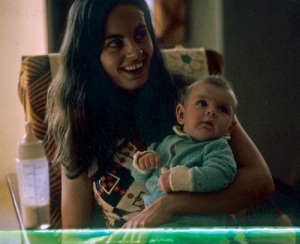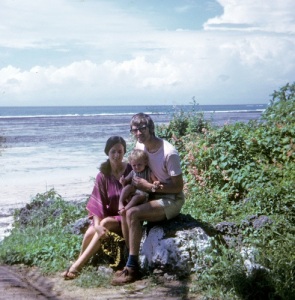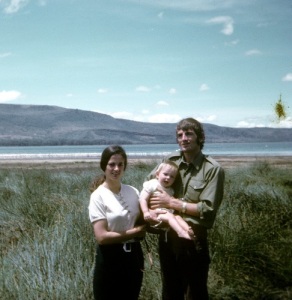“It lets us travel the way a child travels…round and around, and back home again, to a place where we know we are loved.”
—Don Draper, pitching the Kodak Carousel on Mad Men.
I remember playing with the yellow plastic boxes, and my father saying, “Don’t put your paws all over the slides.” I used to hold the squares up to the bedroom window to see tiny pictures of monkeys and babies. They weren’t that exciting, but in those days telly didn’t start until 3 o’clock.
Zambia was mine. My younger sisters were born in Limerick, but I was born in the town of Mansa, Luapula Province, Zambia, Africa, The World, The Universe. I had no memories of the place, and no real curiosity about it, but it was a thrilling claim, in a lions-and-tigers kind of way, and at eight you’ll use whatever might make you special. I liked to tell people I was born in Africa, in that hair-twirling way of small girls who want your attention.
“And I was on an aeroplane, and on the way home from Africa I got sick out the window,” I remember announcing in class one day. One of the boys said that the windows on aeroplanes didn’t open, so it wasn’t true.
I would be 14 before I got on a plane again, and none of the other kids had yet been on one at all, but his challenge put a stop to my boasting. It still stings. (Not long ago my mother told me that yes, I’d had some bad water on a stopover in Addis, and vomited the whole way back—but not out the window.)
My mother was 20 and my father 24, and they were a few days married when they went from Ireland to Zambia to start their teaching careers. It wasn’t an unusual choice at that time. The Irish had gained independence fewer than fifty years earlier, and had started free secondary schooling just within the previous decade. Ireland felt a kinship with African countries through a shared colonial history, and through decades of Catholic mission and relief work.
In the late 60s and 70s, newly-independent African nations were offering contracts for foreign engineers, doctors, and teachers, just at the time that the first Irish generation to get free secondary schooling were coming out of college with their first-in-the-family degrees. The bolder ones were glad to sign up for a three-year adventure.
Those fresh Irish graduates were neither priests or Peace Corps warriors. They didn’t go to save souls or save lives. They came from a small rock in the Atlantic, and I like to think that they knew what it felt like to be young, far from the center, and thirsty to learn and better themselves. They went to share their brief head start with others like them, while earning a bit of money to send home.
Rural Zambia’s rickety generators, rationed water, and monotonous mealie-meal weren’t hardships for my parents. The cottage in which my father was reared didn’t get electricity until he was ten, and never had plumbing. If he had been born a year or two earlier, he would have left school at 14 to cut bog turf or lay bricks on London construction sites.
My parents weren’t the only young couple on that long journey heading out on one of those contracts. They watched the other passengers to see who stayed with them past Rome, past Addis Ababa, past Nairobi, and onward to Lusaka. A girl with a shiny new wedding ring turned to my mother on the last leg, weeping, and asked her “Do you miss your mammy too?” They are still friends with Esther today.
Esther’s baby, Danielle, was born a month before me. She was Town Mouse and I was Bush Mouse. I was the first white baby born in the Mansa clinic, 18 months after they arrived, and my mother didn’t see a doctor until late in her labour, when we were both troubled. Afterwards, she washed in a pitch-dark bathroom and then discovered next morning that it was thick with flies and filthy; she became infected and very sick. She remembers the other mothers laughing at her mottled, red-faced baby, but says she didn’t mind.
We didn’t have many photos from Zambia in our house in Limerick—a few square, white-bordered prints of leopards, my christening, and the gleaming young men on the football team at St. Clement’s Secondary School, where my father taught. But there were dozens and dozens of photos of my younger sisters, born six and nine years later, and I decided—with more logic than bitterness—that this was because they were so clearly cute, while I had brown hair and glasses.
It wasn’t until a trip home last September that I remembered the yellow boxes of slides. My parents hadn’t owned a slide projector, and we had never seen them properly. Over the years their pictures had faded first into mystery and then into oblivion. At some point they had been shunted up to the attic. My mother wasn’t sure about letting me have them—I’m known to lose things—but I persuaded my sister to climb up to the attic and pass them down to me, in a precarious operation that had the three of us yelping “Oh Jesus! Watch it!”
I brought the slides back to San Francisco and eventually got round to shipping them to a scanning service down the road in Burlingame. They sent them on to Mumbai, where Indian workers would scan each slide by hand and color-correct them for my digital approval, then return them to San Francisco along with a DVD copy of their contents.
We are moving, says my friend Richard, from a world of things to a world of flows. The Zambia slides had a long journey in years and miles. They were carried across four continents and three decades, encased in yellow plastic boxes, in suitcases, in bubble wrap and styrofoam peanuts, in cardboard boxes and packing tape, until one day their atoms were reborn as bits and their hidden stories began to flow.
I opened the links on my computer at work. There was the baby that was once me—smiling, pondering, sleeping, bawling, floating. There were my parents, hip and beautiful and improbably young, wearing bright colors. And there was Zambia, dusty, sunny, with new brick buildings and vivid red bushes.
These were my blurred stories but not my memories, and I wished that I were discovering them with my mother and father instead of sitting alone 5,000 miles away. Digital photos don’t live anywhere. There’s no ritual of setting up the projector and dimming the lights. You’re not passing loose photos across a kitchen table, or squeezing in beside someone to turn the pages of an album. Loosed on the web, these photos seemed ephemeral and indestructible, detached and yet achingly intimate, years ago and yesterday.
I sent the links to my sister in Canada and to my friends at work, because I wanted the photos seen. How can you not bite your lip at the sight of a tiny baby, wet and kicking after a basin-bath, even if that baby is—somehow—yourself?
As I said, I was six when my sister was born, and as an almost-only child I believed myself to be self-sufficient. I remember vividly the night I learned to read, some time before I was four. My mother was re-reading an Enid Blyton story about Santa Claus getting stuck in the chimney of a factory. I was curled under her arm, sucking my thumb and imbibing the bliss of a story, and then there was a moment when the words on the page unscrambled, and I knew by the shape of them what each one said. It was fabulously exciting. From now on, I could read myself a story any time I wanted, forever and ever. It was my emancipation.
That’s what I remember—being a good girl, being the big sister, being able to tie my own shoes and put on my pyjamas, being able to learn off my spellings and read my own bedtime stories. All my life, I have shrunk from needing things from others. Yet these Zambia photos tell a different story, one that makes my throat swell. I wasn’t an independent little creature. I was a baby who was swaddled and held—in the crook of my father’s arm, on my mother’s hip, on their laps and shoulders, in lakes and on land—and I accepted it with grace and satisfaction. My parents didn’t have a Baby Bjorn to keep their hands free for their iPhones. Even though the Zambian babies were carried in wraps, it hadn’t occurred to my parents to do the same. They brought me everywhere—on safari in the back of a friend’s tiny Volkswagen Beetle, to parties with their childless friends, backpacking through Kenya, Zimbabwe, and Tanzania. We were a trio.



This year, 2010, my parents will be married forty years, and my mother will turn sixty. I no longer gaze up at them daily with total dependence and devotion, but now I know how much I once did. And through their old photos I’ve learned to read another love story.


If I know aught of myself, no one whose mind is introspective–and mine is painfully so–can have a less respect for his present identity, than I have for the man Elia. I know him to be light, and vain, and humorsome; a notorious ***; addicted to ****: averse from counsel, neither taking it, nor offering it;–*** besides; a stammering buffoon; what you will; lay it on, and spare not; I subscribe to it all, and much more, than thou canst be willing to lay at his door–but for the child Elia–that “other me,” there, in the back-ground–I must take leave to cherish the remembrance of that young master–with as little reference, I protest, to this stupid changeling of five-and-forty, as if it had been a child of some other house, and not of my parents. I can cry over its patient small-pox at five, and rougher medicaments. I can lay its poor fevered head upon the sick pillow at Christ’s, and wake with it in surprise at the gentle posture of maternal tenderness hanging over it, that unknown had watched its sleep. I know how it shrank from any the least colour of falsehood.–God help thee, Elia, how art thou changed! Thou art sophisticated.–I know how honest, how courageous (for a weakling) it was–how religious, how imaginative, how hopeful! From what have I not fallen, if the child I remember was indeed myself,–and not some dissembling guardian, presenting a false identity, to give the rule to my unpractised steps, and regulate the tone of my moral being!
That I am fond of indulging, beyond a hope of sympathy, in such retrospection, may be the symptom of some sickly idiosyncrasy. Or is it owing to another cause; simply, that being without wife or family, I have not learned to project myself enough out of myself; and having no offspring of my own to dally with, I turn back upon memory and adopt my own early idea, as my heir and favourite?
—Charles Lamb, ”New Year’s Eve,” 1821





Another beautiful post, Dervala. Thank you.
LikeLike
That has to be one of the most moving digitisation projects I’ve read about yet. (Interesting that us big Irish sisters hate needing help, innit.)
You all look gorgeous in Zambia. Thanks for sharing them.
LikeLike
Beautiful pictures!
Do be careful to keep the slides intact, though. The color on them is far more stable than the digital pits on a DVD. (Of course, it’s easier to copy the DVD onto a new medium.)
In addition, if you don’t mind all the world being able to see them, you might upload them to the Internet Archive. A Jewish friend of mine digitized a tape recording of his father’s recollections of liberating a concentration camp as a U.S. soldier in 1945 and uploaded that; it’s important to have such first-hand historical records.
Linguistic note: “sophisticated” in Charles Lamb’s day meant “contaminated” as well as its current meaning. “Unsophisticated ale” was ale brewed without hops.
LikeLike
Beautiful and, as ever, beautifully written. (Prompt for 2010 duly delivered.)
LikeLike
Thanks for taking me back to my childhood.
Now I am feeling so very guilty about not setting up my brother in Pennsylvania with the scanner he needs to digitise 60 years of transparencies, some from the decades before anyone in my family flew.
LikeLike
Beautiful piece, Dervala. Hits you like a warm wave. Thanks.
LikeLike
Very moving and vivid. The picture of your father reminded me of that funny post where you have him near a bicycle and talking about how young he feels at 60 something. Your mother is gorgeous and her face is your face, or at least I see it that way. This is a wonderful piece and you should send it out to Literary Journals that publish nonfiction, or write a memoir. With Holden now gone, there is even more room for a new and younger voice.
I’m here-
Ernesto–
LikeLike
Just think what an interesting life lies before you!
LikeLike
A beautiful reminder that we all need others. Thank you for sharing these wonderful photos!
LikeLike
I’m struck by how much your beautiful mother looks like you.
LikeLike
A beautiful story! I’m glad I read it. Great photos too.
LikeLike
Dear Dervala:
I’d like you to write some more.
Thank you,
Tony
LikeLike
I sit here longing for another post by Dervala. I hope all is OK. It has been too long since she has posted here.
LikeLike